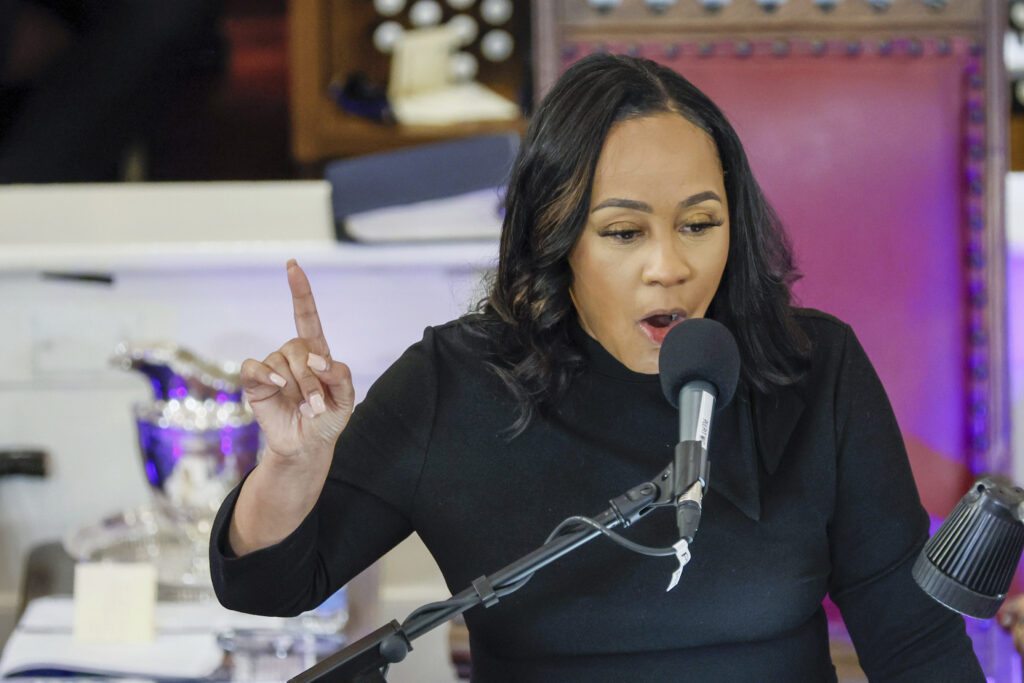Fani Willis’s Secret Lover, Nathan Wade, Sues AT&T for ‘Mental Anguish’ for Sharing ‘Vast and Intimate’ Details of Their Affair
The erstwhile special prosecutor wants the telecommunications giant to compensate him for a ‘breathtaking’ breach of privacy.

The filing of a federal civil suit in Georgia by the lawyer and erstwhile special prosecutor Nathan Wade against the telecommunications giant AT&T threatens to revive the scandal of his secret romance with the district attorney of Fulton County, Fani Willis.
The affair between Mr. Wade and Ms. Willis led to her suspension from the prosecution she brought against President Trump and 18 others for allegedly seeking to overturn the results of the 2020 presidential election. Mr. Wade was paid some $700,000 of taxpayer funds for his services despite never before having prosecuted a felony.
The current lawsuit stems from that successful disqualification effort, which was launched by Mr. Trump’s co-defendants in the sprawling racketeering case. Clues that Mr. Wade and Ms. Willis were conducting an affair surfaced during contentious divorce proceedings between Mr. Wade and his ex-wife, Joycelyn. Once Mr. Wade was hired, he and Ms. Willis took vacations together to destinations like Aruba, Napa Valley, and Belize.
Mr. Wade and Ms. Willis denied under oath that their affair predated him joining the case, though a televised hearing devoted to the matter included testimony from witnesses who suggested otherwise. The trial judge, Scott McAfee, found that the pair’s testimony emitted an “odor of mendacity” and was “legally improper.” He ruled that Ms. Willis could stay on the case if Mr. Wade resigned, which he promptly did.
Judge McAfee’s ruling was overturned by the Georgia court of appeals, which found that Ms. Willis’s behavior emitted a “significant appearance of impropriety” so noxious that only disqualification could remedy it. The vote of the appellate court was two to one, with the dissenter warning that his colleagues overstepped their authority in reversing Judge McAfee.
As part of the disqualification proceedings AT&T produced what Mr. Wade’s lawyers call “a vast and intimate window into Mr. Wade’s personal life without his knowledge or consent. The details in these records were breathtaking: they showed every call Mr. Wade made or received, every text message he sent or received, and his precise location during each and every one of those contacts.”
The data, as interpreted by an investigator for the defendants, appears to show 2,000 calls and nearly 12,000 texts exchanged between Ms. Willis and Mr. Wade, the majority of which predate his joining her office — before, he claims, the romance had begun.
“Geolocation activity,” the investigator’s affidavit claims, discloses that Mr. Wade’s cellular phone connected to a tower near where Ms. Willis was living at least 35 times before he was hired. The affidavit adds that the data suggest that he was “stationary” during those visits, meaning that he was not just passing through.
Mr. Wade contends that the records allowed the defendants pushing to disqualify Ms. Willis to “ascertain nearly every detail about his personal life—and many confidential details about the ongoing prosecution.” He contends that AT&T failed to provide him with sufficient notice or due process before forking over the kind of information that the Supreme Court has called the “privacies of life.”

Mr. Wade alleges that AT&T “jeopardized both his well-being and public safety when it unlawfully released” more than 14,000 pages of his cellphone data, including location information, as well as call and text records. Mr. Wade’s attorneys write that “AT&T’s reckless disregard for Mr. Wade’s safety, and its violation of both the law and its own promises to its users, has robbed Mr. Wade of his privacy and led to years of harassment and mental anguish.”
In Mr. Wade’s telling AT&T produced these records without providing Mr. Wade any actual notice or opportunity to object, sending only an unsigned “Dear Valued AT&T Customer” letter by email. He claims that the notice went to his “Spam” folder. He argues that AT&T’s disclosure of his information without redaction was a breach of both federal and state privacy laws as well as its “own affirmative promises to users like Mr. Wade.”
The data could have played a part in persuading the Georgia court of appeals that Ms. Willis was lying about when her affair began. That appellate tribunal reckoned that the relationship could have affected her “discretion” in bringing the case. A lawyer, Harvey Silverglate, for one of Mr. Trump’s co-defendants, John Eastman, tells the Sun that he reckons that Ms. Willis elected to bring a complex racketeering case to provide her lover with more work.
The court of appeals determined that Ms. Willis’s was the “rare case in which disqualification is mandated and no other remedy will suffice to restore public confidence in the integrity of these proceedings.” She appealed to the Georgia supreme court, which has not decided whether it will hear the case or leave the disqualification in place.
For his part Mr. Wade — despite his newfound concerns about his privacy — has been unapologetic about the romance in interviews with national news and entertainment outlets. He told ABC News that workplace affairs are as “American as apple pie.” He also discussed the romance on “The Daily Show” with Marlon Wayans.
Mr. Wade’s attorneys write that when their client was drafted by Ms. Willis, he “did what he had done for decades: he stepped up … to be the public face and the legal engine behind the State’s prosecution, which concerned some of the most famous politicians in the country.”
The two have represented that they broke up — and are “friends,” but they have been spotted together at LAX as well as during a roadside arrest of Ms. Willis’s daughter. Mr. Wade now wants AT&T to pay “damages in an amount to be determined at trial, plus interest in accordance with law, including an award of punitive damages.” He is also seeking lawyers’ fees.

